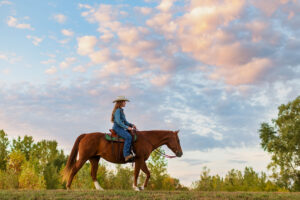Miniature Horse Serves as Guide for Blind Florida Woman
As she once did with guide dogs, Spencer walks with the 6-year-old spotted tan and white
- Topics: Article
Confetti the Miniature horse is Cheryl Spencer’s eyes and goes with her everywhere, one of the few guide horses helping the blind in this country.
As she once did with guide dogs, Spencer walks with the 6-year-old spotted tan and white Appaloosa, holding the harness as the mare leads the way. The 29-inch tall, 150-pound horse rides in the Spencers’ minivan, standing between the front seats, and has flown to Boston aboard a jetliner, riding in the bulkhead.
Confetti spent an evening aboard a casino ship off the Florida coast, listened to the roar of Bike Week in Daytona Beach and the screams of women at a Tom Jones concert. The sound of thundering jets at Blue Angels and Thunderbird air shows did not panic her, and she has visited the Kennedy Space Center, Walt Disney World and Cypress Gardens.
Confetti has the run of the Jacksonville home Spencer shares with her husband, Chris, nuzzling her way through doors, sleeping in the closet and bathing in the shower. She is housebroken, nuzzling Cheryl’s hand when she wants outside, and stands silently when the Spencers eat at restaurants.
“She is literally a dog in horse’s clothing,” Cheryl Spencer said. As she held a cat in her lap, Confetti nuzzled it and licked a visitor’s shoes.
The Guide Horse Foundation’s Web site lists several advantages Miniature horses have over dogs as service animals, including:
- Horses might live 30 to 40 years, compared with eight to 12 years for dogs.
- They have better acceptance than dogs in public places.
- They have a calm nature and are not easily distracted.
- They have a great memory, excellent vision and high stamina.
But the 50,000-member National Federation of The Blind adopted a resolution at its 2001 convention opposing the use of guide horses. Spokesman John G. Pare said the organization is concerned that other animals could not be properly trained to meet the travel and social needs of blind people.
“We affirm the fundamental right of blind people to use properly trained dogs and oppose any efforts, such as the use of inappropriate animals, which would degrade that right,” the resolution said.
Confetti and Cheryl Spencer. |
Cheryl Spencer, a dispatcher for the Jacksonville Transportation Authority, began losing her sight as a teenager and can now see nothing. She has had two guide dogs, Tammy and Delta, and says Confetti is also an effective guide, doing everything the dogs could do.
When Delta began losing her effectiveness as a guide dog, Spencer, 52, despaired about getting another dog, but she said she felt she would lose some of her independence by relying on her cane.
“I started to miss her and she wasn’t even gone,” Cheryl said.
Then, her sister mailed her an article from People magazine about a guide horse. After first dismissing the idea as ridiculous, Cheryl and her husband began looking into the possibility.
They visited the Guide Horse Foundation in Kittrell, N.C., in 2001 but were told there weren’t enough horses to satisfy the demand. It was suggested they get their own horse and find a trainer.
They found Confetti by sending an e-mail to all the Miniature horse farms within driving distance of Jacksonville, saying they were looking for an animal, 26 inches high or less, to be trained as a guide for the blind.
Barbara McDermott with JBR Ranch in Christmas saw the ad but was slow in responding. She had Confetti, who was 27-inches high, but had planned to keep her as a pet because she was too small to breed.
Then Spencer, her husband and trainer, Debbie King, came to visit and “It was love at first touch,” McDermott said.
McDermott originally wanted $3,000 for Confetti, but was eventually convinced to donate her to Spencer.
“Cheryl needed her more,” McDermott said.
Next came the training. The Spencers bought the book, Horses for Dummies, and King taught Confetti the basic commands and later used Gail Ray to complete the training.
McDermott said not all mini horses are suitable as guide animals, but Confetti is perfect because of her temperament and intelligence.
Much of Confetti’s constant training has been done by the Spencers. Chris Spencer worked on housebreaking and they have worked to get Confetti used to motorcycles and even jets.
Cheryl said there are misconceptions about guide animals, including the belief that they can tell the difference between red and green traffic lights.
“Guides are there to keep you safe and navigate around things,” Cheryl said.
Confetti and Cheryl are certified by Florida Service Dogs Inc., said Carol Christopherson, the founder and president of the Jacksonville-based organization.
The certification ensures the safety of the public, as well as testing the skills of the animal and the leadership of the handler, she said. There is no federal or state statute requiring service animals to be certified, she said.
The organization has certified one other Miniature horse, as well as several different sizes and breeds of dogs, and a goat.
The Spencers have found that Confetti is welcome almost everywhere, even more than guide dogs. Children flock to her and she appeared at a kids’ Christmas party.
“We’ve had total acceptance. People love the idea of a guide horse,” Cheryl Spencer said. “She is an amazing animal.”
She wishes, however, that she could see Confetti.
“I’m told she’s gorgeous
Create a free account with TheHorse.com to view this content.
TheHorse.com is home to thousands of free articles about horse health care. In order to access some of our exclusive free content, you must be signed into TheHorse.com.
Start your free account today!
Already have an account?
and continue reading.
Related Articles
Stay on top of the most recent Horse Health news with



















